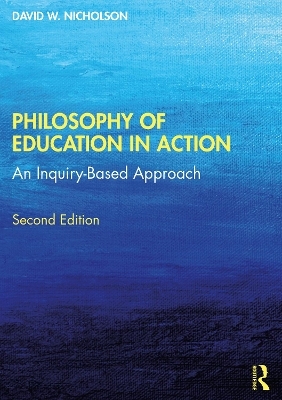
Philosophy of Education in Action
Routledge (Verlag)
978-0-367-55759-1 (ISBN)
Philosophy of Education in Action: An Inquiry-Based Approach (Second Edition) is an innovative introductory text that invites readers to explore philosophy of education through the lens of their own observations and experiences. Using the Wonder Model of Inquiry, readers investigate the purposes of education, how schools are designed to fulfill those purposes, and the influence of philosophy on educational practices.
Grounded in authentic classroom vignettes and supported by examples from actual schools and educational programs, readers think critically and creatively about philosophical issues. Probing questions analyze the curriculum, examine pedagogy, conceptualize the role of the teacher and student in the learning process, and explore the role of school organization and design. Readers are guided to reflect upon their own practices and articulate their own philosophical beliefs. Readers also imagine and design a hypothetical school using project-based methods to interpret, synthesize, and evaluate different educational philosophies. The Continuum of Educational Philosophy locates practices in relation to philosophical perspectives.
The Second Edition includes updated sources and examples of schools and programs that represent different philosophical perspectives. In addition to applying the "3Cs" criteria of evaluation, two new chapters highlight voices that respond to and challenge different educational philosophies. The final chapter adds guidance on how to construct and compose a personal philosophy of education statement.
David W. Nicholson is Professor of Education at Stevenson University in Maryland, USA, where he teaches courses in philosophy of education and methods of teaching English/Language Arts and Social Studies.
Preface; Part I: How Does Philosophy Influence Education?; 1. Why Study Philosophy of Education?; 2. How Do I Conduct Inquiry into Philosophies of Education?; Part II: What If … The Purpose of Education Were to Learn Objective, Universal Knowledge?; 3. What If … The Purpose of Education Were to Learn Enduring Ideas and Eternal Truths?; 4. What if … The Purpose of Education Were to Learn Structure and Principles?; 5. What if … the Purpose of Education were to Learn Essential Knowledge?; 6. Voices from Outside: What Do Others Wonder about the Perspectives?; Part III: What If … The Purpose of Education Were to Learn Subjective, Changing Knowledge?; 7. What If … The Purpose of Education Were to Learn According to Natural Development?; 8. What If … The Purpose of Education Were to Learn According to Feeling and Imagination?; 9. What If … The Purpose of Education Were to Learn to Solve Practical Problems?; 10. What If … The Purpose of Education Were to Learn as a Community?; 11. What If … The Purpose of Education Were to Learn to Transform Society?; 12. What If … The Purpose of Education Were to Learn to Develop Individual Identity and Personal Freedom?; 13. More Voices: What Do Others Wonder about the Perspectives?; Part IV: How Do I Synthesize What I Have Learned into My Own Philosophy of Education?; 14. What If … I Could Design My Own School?
| Erscheinungsdatum | 08.02.2022 |
|---|---|
| Zusatzinfo | 12 Tables, black and white; 14 Line drawings, black and white; 14 Illustrations, black and white |
| Verlagsort | London |
| Sprache | englisch |
| Maße | 178 x 254 mm |
| Gewicht | 540 g |
| Themenwelt | Sozialwissenschaften ► Pädagogik ► Allgemeines / Lexika |
| Sozialwissenschaften ► Pädagogik ► Bildungstheorie | |
| ISBN-10 | 0-367-55759-2 / 0367557592 |
| ISBN-13 | 978-0-367-55759-1 / 9780367557591 |
| Zustand | Neuware |
| Haben Sie eine Frage zum Produkt? |
aus dem Bereich


